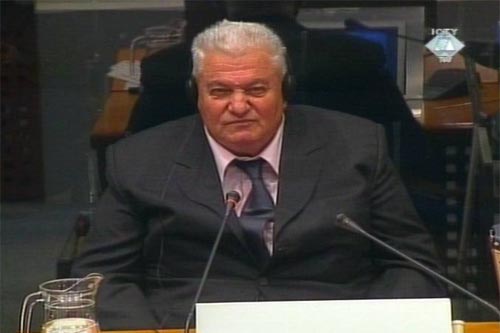Home
MILOSEVIC’S RELATIONSHIP WITH THE “SERBIAN RESISTANCE” IN KOSOVO
In his cross-examination of Kosta Bulatovic, the prosecutor tried to reconstruct the different phases in the relationship between Slobodan Milosevic and the Kosovo Serbs’ “resistance” from the late eighties until the mid-nineties
 Kosta Bulatovic, witness in the Milosevic trial
Kosta Bulatovic, witness in the Milosevic trial After he was charged with contempt of court last week for his refusal to testify in the absence of the accused, Kosta Bulatovic answered the prosecutor’s questions today, as Slobodan Milosevic returned to the courtroom.
Before the beginning of the cross-examination, Milosevic objected to the Trial Chamber’s attempt last week to continue the trial in his absence, quoting the Statute of the Tribunal and other documents defining “trial in the presence of the accused” as one of the “guaranteed minimal rights”. Judge Robinson rejected the objection, noting that the Chamber had “considered the problem and made its decision”, and informed the accused to challenge this decision before the Appeals Chamber.
In his cross-examination of Kosta Bulatovic, prosecutor Geoffrey Nice tried to reconstruct Milosevic’s relationship with the Kosovo Serbs’ “resistance”; the witness was one of the leaders of this movement. The prosecutor quoted what Bulatovic himself had said about that relationship in October 1994. In an interview with a Belgrade weekly, Bulatovic said that the Kosovo Serbs’ movement “created Milosevic”, who “climbed to the throne on its shoulders.” Bulatovic there admitted, in a fit of self-criticism, that the Kosovo Serbs’ movement had “let the genie out of the bottle” and was therefore responsible for the situation that prevailed in Serbia and the “Serb lands” in BH and Croatia as a result of Milosevic’s policy.
Bulatovic then continued: “If Milosevic abandoned Republika Srpska, where he had both the people and the territory, overnight, what will happen in Kosovo, where he has neither the people nor the territory?”
When asked if he “accepts as correct” what was read out to him, Bulatovic replied he “partly accepted it and partly not,” but did not explain what parts he accepted.
The prosecutor espoused Bulatovic’s argument from the interview that Milosevic had used the Kosovo Serbs’ resistance movement for his own ends: to cement his power, push through the constitutional amendments, abolish the autonomy of Vojvodina and Kosovo, centralize Serbia and gain control over Montenegro. As well as the argument that when Milosevic focused his attention on new plans and affairs, he relinquished the Kosovo Serbs. In the mid-nineties, in various public statements, such as the one Bulatovic made, they criticized him and reminded him of the promises not kept.
The prosecutor says that Milosevich, seeing that he was losing the support of the hard-core Kosovo Serbs, stepped up the repression against the Kosovo Albanians in mid-nineties. The prosecutor claims that police brutality, restrictions of the freedom of assembly and political trials were “Milosevic’s response to the pressure” exerted by Bulatovic and other leaders of the Serb “resistance” in Kosovo. The final result of all that, the prosecutor contends, was the mass deportations and murders of Kosovo Albanians in the first half of 1999.
Bulatovic, however, rejects this interpretation of Milosevic’s relationship with the Serbian “resistance”, particularly the final result – deportations and murders. He claims they were the result of NATO air strikes. “Everyone fled Kosovo [because of air strikes] not only Albanians” in the spring of 1999.
At the end of the testimony, Kosta Bulatovic wished “all the best to my President Milosevic”, adding he hoped to “see him soon in Belgrade.” Bulatovic will return to The Hague on 5 May, for his trial on contempt of court charges. He will not have an opportunity to meet his president again, except perhaps in the UN Detention Unit.
After Bulatovic, Milosevic called as his witness Dragan Jasovic, former CID inspector from Urosevac in Kosovo. In 1998 and 1999, he participated in the investigations of KLA activities.
Linked Reports
- Case : Milosevic Slobodan - "Kosovo, Croatia and Bosnia"
- 2005-04-19 MILOSEVIC’S WITNESSES CHALLENGE THE TRIBUNAL’S AUTHORITY AGAIN
- 2005-04-14 MILOSEVIC WILL NOT TESTIFY IN HIS OWN DEFENCE
- 2005-04-13 SOME WERE SOLDIERS AND OTHERS WERE NOT CIVILIANS
- 2005-04-26 PROSECUTOR ACCEPTS MILOSEVIC’S LIST OF VICTIMS FROM RACAK
- 2005-04-27 PRICE OF “MR. NICE’S KINDNESS”
- 2005-05-04 MILOSEVIC GOES INTO EXTRA TIME
